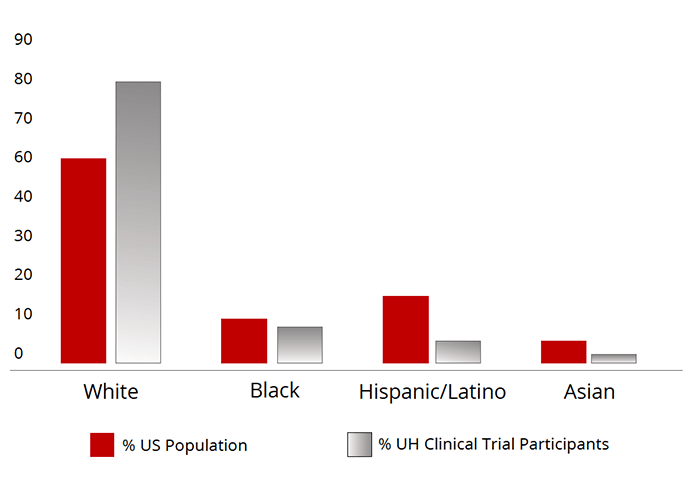Diversity in Clinical Research Matters
There is a significant imbalance in the representation of racial and ethnic minorities in clinical research. Diverse representation in research studies and clinical trials is key to advancing health equity and outcomes.
Why is diversity in clinical research participation important?
 The success of research studies depends on it! An imbalance of representation leads to limitations in clinical outcomes, distrust, and less effective treatments overall. People may react differently to the same treatment based on age, gender, weight, race, ethnicity, and other factors. By including people from all backgrounds, doctors can better determine if treatments are safe and work well for people from different communities.
The success of research studies depends on it! An imbalance of representation leads to limitations in clinical outcomes, distrust, and less effective treatments overall. People may react differently to the same treatment based on age, gender, weight, race, ethnicity, and other factors. By including people from all backgrounds, doctors can better determine if treatments are safe and work well for people from different communities.
Clinical research studies are health projects that involve people to help doctors and scientists understand, prevent, and treat diseases, and determine which medications work safely for all.
The key factors of diversity can include:
- Race and Ethnicity
- Sex & Gender Identity
- Geographic Location
- Socioeconomic Status
- Cultural & Demographic Characteristics
- Age
Why is it important to have diverse caregivers advocating for research?
Seeing diversity and representation in the workforce helps build patients’ comfort knowing there are people that “look like them” they can trust. Plus, caregivers are patients too!
What can UH Caregivers do to increase diversity in clinical research?
- Create a culture that provides everyone a safe space and the opportunity to talk about clinical research. Diverse caregivers advocating for research builds trust in the community.
- Educate yourself and others about why clinical research is important.
- Continue the conversation! Normalize talking to family, friends, coworkers, neighbors, etc. about clinical research.


